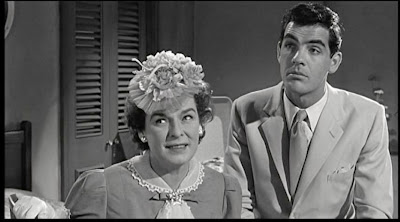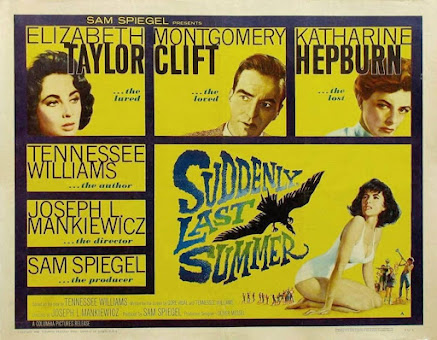Watching Suddenly,
Last Summer (adapted for the screen by Gore Vidal and Tennessee Williams
from Williams'1958 play), it's hard not to think about the frequency with which homosexuality=death
themes crop up in Tennessee Williams' works, and to wonder to what extent some gay
artists have been subtly complicit in perpetuating damaging social perceptions of
homosexuality.
In 1937 New Orleans (a year necessary perhaps to emphasize
the infancy of lobotomy surgery, but not at all evident in the '50s-style
clothes, hairdos, and make-up on display), super-rich widow Violet Venable seeks
to secure— through not-so-subtle bribery—the services of groundbreaking
psychosurgeon John Cukrowicz. Her objective is to have the doctor perform a
lobotomy on her beautiful niece, Catherine, who apparently went insane the
previous summer after witnessing the death of Mrs. Venable's adult son,
Sebastian.
 |
| Lady's Very Hungry Today "The Venus Fly-Trap, a devouring organism aptly named for the goddess of love." |
The mysterious particulars of Sebastian's death, life, and the reason behind Mrs. Venable's wish to silence her niece make up the narrative body of Suddenly, Last Summer. A film whose overarching Freudianism (intentionally or not) parallels closet homosexuality with everything from pedophilia and mother fixation to sociopathology and flesh-eating prehistoric monsters.
 |
| Elizabeth Taylor as Catherine Holly |
 |
| Katharine Hepburn as Mrs.Violet Venable |
 |
| Montgomery Clift as Dr. John Cukrowicz |
Expressly acknowledged queer characters appear in only
a handful of this prolific playwright's body of work: Cat on a Hot Tin Roof (Skipper, who commits suicide); A Streetcar Named Desire (Blanche's
husband Allan, also a suicide); and this, Suddenly,
Last Summer (Sebastian, murdered and cannibalized). But wouldn't you know
it? They're the works that have had the greatest longevity. (Tennessee Williams
didn't initiate popular culture's tiresomely persistent association of
homosexuality with death. In Lillian Hellman's 1934 play, The Children's Hour, a character's mere suspicion that she might be
a lesbian is enough to induce her to hang herself.)
There are those who believe it's folly to look at old movies
through a contemporary prism. I personally think that it's essential to keep in mind the
cultural context and social time frame of films; but I also believe that all true
art endures. And as such, one of the important challenges facing any creative
work to which the term "art" is to be applied is its ability to withstand the critical
application of changing cultural sensibilities.
 |
| Mercedes McCambridge (Giant) and Gary Raymond ( Look Back in Anger) as Violet Venable's poor relations |
WHAT I LOVE ABOUT THIS FILM
In an unfavorable review of Suddenly, Last Summer in The
New York Times, critic Bosley Crowther denounced the film for its
talkiness. A valid point, perhaps, for 1959. But in today's "Era of the Inarticulate,"
the euphuistic language of Suddenly, Last
Summer is like an oasis in a desert.
"The dinosaurs are vegetarian… that's why they became
extinct. They were just too gentle for their size. And then the carnivorous
creatures, the ones that eat flesh...the killers… inherited the earth. But then
they always do, don't they?"
"Life is a thief. Life steals everything."
"Most people's
lives...what are they but trails of debris? Each day more debris, more debris.
Long, long trails of debris with nothing to clean it all up but death."
"Mr. Venable
was a good man, but dull to the point of genius."
"Of course God is cruel. No, we've always known about Him. The savage face he shows to people
and the fierce things he shouts. That's all we ever really see or hear of him
now. Nobody seems to know why."
 |
| Sebastian's empty book of poetry |
PERFORMANCES
My admiration for Elizabeth Taylor is well documented in the
blog posts for Who's Afraid of Virginia Woolf? and Reflections in a Golden Eye. The real
surprise for me here is how much I was impressed by Katharine Hepburn. Never
one of my favorite actresses, here all of her starchy mannerisms and stylistic affectations
have been put to fine service in helping to flesh out the marvelously complex
character of Violet Venable. As the domineering, cold-hearted mother who is
willing to go to monstrous lengths to protect the reputation of her son,
Hepburn could have easily played the brittle, icy card exclusively and her
performance would still have been a marvel. What she does that really blows me
away is convey, through wounded, frightened looks and a barely-perceived sense
of grasping desperation; her character's achingly lonely, desolate life. In the
film's final moments, when it becomes clear that the obsessive, stifling love
of Mrs. Venable's life never loved her at all, her character's complete and
absolute despondency is heartbreaking.
 |
| The Goddess from the Machine |
Katharine Hepburn's entrance in the film has to be one of
the great screen entrances of all time. Descending from the ceiling in an ornate,
cage-like elevator, Mrs. Venable addresses the surgeon she has summoned to her
home:
"The Emperor of
Byzantium, when he received people in audience, had a throne which during the
conversation would rise mysteriously in the air to the consternation of the
visitors. But as we are living in a democracy I reverse the procedure; I don't rise,
I come down."
It's very nearly my favorite moment in the film.
THE STUFF OF FANTASY
When I was small, I remember my older sister telling me that
Elizabeth Taylor and Montgomery Clift were really the same person, and scenes and
photos of them together were accomplished through split-screen special effects,
like on The Patty Duke Show. For a while, I actually believed her… although now it occurs to me that I never asked which of
the two was the original article.
In the three films they made together (A Place in the Sun, Raintree
County, and Suddenly, Last Summer)
the dark, strikingly similar beauty of Taylor and Clift always insinuated a
kind of spiritual kinship between their characters. A quality used to deeply empathetic
effect in Suddenly, Last Summer. When
Catherine first meets the doctor, we immediately sense (as does Catherine) that
there is something the two share that makes it possible for him to so quickly allay
her fear and apprehension.
(When informed that the word Cukrowicz is the Polish word for
sugar, Mrs. Venable wastes no time in referring to the physician as Dr.
Sugar; although from her tone it's impossible to ascertain if it's said in a friendly
or mocking manner.)
The image of queerness Tennessee Williams presents in Suddenly, Last Summer may be grotesque
to an almost preposterous degree, but I happen to like how it fits with the
film's themes of duality and displacement. In this context, homosexuality is the
ultimate attraction of self. As manifest by the self-loathing poet, Sebastian,
the allure of the similar (similar dark beauty, similar refined tastes, similar
pitiless view of humanity) is a hunger unfulfilled. Named for the martyred
saint whose portrait dominates his studio, Sebastian's face is never shown, but we know his clothes perfectly
fit his male cousin George, and that George (equally as dark as Dr. Cukrowicz and
his sister, Catherine) looks from the back, remarkably like Sebastian.
 |
| Recurrent Imagery Angel of Death statue first appearing in Sebastian's nightmarish garden (above) reappears on the hill in Cabeza de Lobo (Wolf's Head) where Sebastian meets his fate |
THE STUFF OF DREAMS
I really love the structure of Suddenly, Last Summer. On first viewing, it's a puzzlingly
bizarre Freudian murder mystery that grows increasingly dark and perverse as it
leisurely wends its way towards its satisfyingly astonishing payoff. On repeat
visits, the enjoyment derived from Suddenly, Last Summer comes from the many fascinating existential questions the film poses about God, humanity, and the
nature of evil.
People frequently look to nature and, upon witnessing the brutal
dance of carnage and death in the animal world, defend its neutrality. It's the
cycle of life; it can't be characterized as evil because animals only kill out
of hunger and a will to survive. Throughout all of nature (plant life: the carnivorous fly-trap; animal life: Mrs. Venable's witnessing of the sea turtles devoured by carnivorous birds) unspeakable violence, brutality, and the strong feeding on the weak, is accepted as random,
blameless, and part of natural law.
 |
| Witness to The God of Carnage |
Suddenly, Last Summer
sets forth the provocative suggestion that man is just a sophisticated, complex animal. As primitive as the plants in Sebastian's nightmare garden. The hungers that drive man may be more complex, but are they just as elemental and necessary to survival as those of any carnivorous plant or four-legged beast? If man has a base hunger for love, a fear of loneliness and a need for human physical contact... aren't the feeding of these hungers simply natural acts, no less elemental than the will to survive? Should man engage in barbaric acts of cruelty and violence to feed these needs, could it be possible that God can be
looking down upon it all with the same blameless neutrality we ascribe to nature? Suddenly, Last Summer is an allegorical rumination on the disquieting interchangeably of the words "devour" and "use" for the word "love."
 |
| Suddenly, Last Summer The Day of the Locust |
That Tennessee Williams and Gore Vidal do such an eloquent job
dramatizing such intriguing philosophical concepts is one reason why I'm able to
(begrudgingly) overlook the patina of homophobia calcifying along the film's
edges.
But perhaps if I'm really being honest with myself, the one reason, above all others, for Suddenly, Last Summer remaining an all-time, lasting favorite- it is the absolutely breathtaking Elizabeth Taylor
...the last of the great movie stars.



